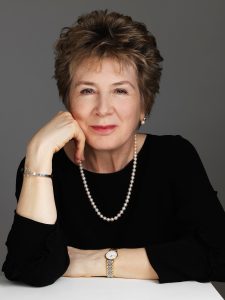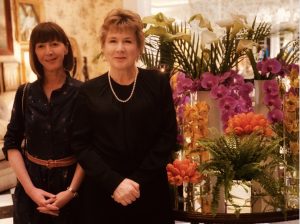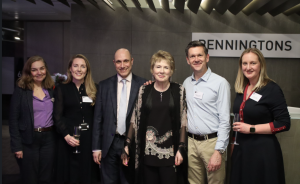Jane Craig: A trailblazer and a torchlight
To mark Jane Craig’s retirement after many years at the coalface of family law, Jo Edwards, who worked closely with her both at Resolution and in practice, caught up with her for a recap and a reminisce, while Graeme Fraser provides an angle from the Cohabitation Committee.

Jane Craig
Jo – I wondered if I may start by understanding your background and journey into law.
Jane – It’s not a classic lawyer’s background! My parents left school in their teens. My father was a farmer in Bermuda, my mother was English. They met when she was nannying in Bermuda, fell in love and he followed her to England to propose. I went to a comprehensive school and never intended to be a lawyer.
I decided to study law because one of my teachers said “you’ve got quite a nitpicking mind, why don’t you think about law”. I read law at Southampton University and did my training contract in Middlesbrough, doing a mix of domestic abuse, personal injury and crime work.
On qualifying, I moved back to London. I was an unsuccessful property litigator for a few months before moving to a Legal Aid practice doing exclusively family law. And then I saw an advert for a job at Manches in The Times, which I answered and I got the job, joining in 1988 when I was 5 years PQE.
Jo – What drew you to Manches?
Jane – The advert referred to the Solicitors Family Law Association (as Resolution was then known) and its Code of Practice, ie doing things in a constructive, child-centred way, which appealed to me. I met Jane Simpson, who founded the family department, and I just thought she was an amazing woman who I would love to work with, so was thrilled when she offered me the job.
Jo – Tell us about those early years before you became head of department.
Jane – It was very different from the Legal Aid practice I had worked in; my experience of that gave me a lifelong respect for Legal Aid lawyers, having experienced lots of rushing off to court and writing affidavits by hand in the back of a taxi with a client who had suffered domestic abuse. At Manches it was big money and really complicated children cases. I spent a lot of time thinking about the practice of law and Jane encouraged me to join Resolution.
Jo – So when did your Resolution journey start?
Jane – I would think I probably joined Resolution at the end of 1988 or beginning of 1989. I was on the Training Committee for a number of years and I stood for election to the National Committee but the first time I didn’t get elected. When I was elected the then chair, Rosemary Carter (who had succeeded David Salter) asked me to be her Vice Chair. I was National Chair (after two years as Vice-Chair) from 2001 to 2003.
Jo – What was your biggest achievement as Chair?
Jane – That’s a difficult question! The Domestic Violence committee was set up at my instigation and we did a huge amount of work on cohabitation law reform. Modernising Resolution was another important strand. When I became chair there was no chief executive, so the chair was consulted on everything, eg problems with the drains at the SFLA office. I had to do all the staff appraisals etc, so I was effectively the managing partner of SFLA as well as Chair and spokesperson (and having my day job), which wasn’t sustainable as the organisation got bigger. So National Committee decided that we needed to have a proper structure and a chief executive. Some people worried that if we got more professional we would lose that feeling that we were a member-led organisation, but to this day it’s very much an organisation run by members, for members, as well as for our clients.
Jo – You have long been a passionate advocate for cohabitation reform. Sitting where we are now in 2025, and still an esteemed member of the Cohabitation Committee, what are your hopes for reform?
Jane – I think we will have reform. I don’t know what it will look like and from my point of view, the most important thing is that whatever legislative protection is put in place for cohabitants, it should be opt-out – ie a catch-all that will affect everybody who is living together (in defined circumstances). If the purpose of reform is primarily to protect the more vulnerable cohabitant, usually women, then there has to be an opt-out scheme, not opt-in. As for whether it should be, as the Law Commission recommended and the Women and Equalities Committee said should happen, a scheme that’s not exactly the same as marriage – I vacillate slightly. Some days I’m convinced that the right way forward is to maintain the difference and follow the Law Commission’s recommendations. And sometimes I think, that’s nonsense because lots of people think that cohabitants have the same rights as married people and if we have legislation that falls short of a de facto arrangement, that’s just going to cause more confusion. I just want the law reformed and protection for vulnerable cohabitants. I want there to be fairness and justice.
The Cohabitation Committee has done great work on this, alongside hard work and lobbying by an awful lot of Resolution members and others. I give credit to the academics whose research has bolstered this, like Jens Scherpe, Andy Hayward and Jo Miles; to the Women and Equalities Committee; and Graeme Fraser, who gave powerful evidence to the Select Committee.
Jo – You’ve had countless other professional achievements, Jane. So tell us about other things with which you’ve been involved during the course of a long career.
Jane – I was appointed to the Family Justice Council in 2004 when I finished being Chair of Resolution, as the FJC’s first Private Law Solicitor Member. I Chaired the Children in Families Committee. A piece of work which we were all proud of was the Everybody’s Business report, about what happens when there has been domestic violence but a contact order is made by consent, if there isn’t sufficient investigation into the relationship and the alleged domestic violence. It was prompted by the 29 Child Homicides report about cases of children who had been murdered by their fathers when contact had been ordered. That was a big piece of work for our committee and it led to a Practice Direction being made on the introduction of far more stringent rules about fact finding hearings.
I was a member of the Law Commission’s Cohabitation Project Legal Advisory Group. That was incredibly interesting.
More recently I was part of the FJC’s financial remedies working group, responsible for drafting Sorting Out Finances on Divorce, for lay people; and Guidance on Financial Needs on Divorce, to try to bring greater consistency in judicial decision-making.
And then there was all the drafting for the Cohabitation Committee, like the Guide to Good Practice, not to mention numerous precedents and things that the committee’s worked on. Oh, and I very much enjoyed working on the Civil Partnership legislation when there was a draft Bill in the early noughties.
Jo – And then alongside all of that, you’ve had a busy, stellar practice. You took over from Jane Simpson as head of the family team of Manches in 2006, right? And stayed at the helm for 16 years?
Jane – Yes.
Jo – Tell us some of the highlights of your time being head of family.

Jo Edwards and Jane Craig
Jane – It’s been wonderful to see the team grow. One of the things I’ve most enjoyed is seeing the people I’ve either recruited myself or was instrumental in recruiting, do so well in their careers. I’m looking at you, Jo, and I’m thinking you’re one of those. Anna [Worwood, now head of family], of course, because she was recruited to be my assistant when she was only 2 years qualified and I had just been elected Chair of Resolution.
I was a founder member of our LGBT group and a member of the firm’s Gender Committee. Supporting women in the profession is very important to me. I know we’ve come a long way; we have a female chief executive, a female finance director and a female head of BD, but there is more to be done.
Jo – What are your wider reflections on how the profession has changed during your career?
Jane – The greater prominence of women is one. I do think the profession is kinder now. I think there is a lot more awareness of the need to accept people as they are and greater diversity. We have remote/hybrid working, which has its benefits and downsides. I am so pleased that we now have a growing mediation practice and are involved in all forms of alternatives to court. Alternatives to court such as mediation, arbitration and early neutral evaluation are now mainstream, whereas once they were very much on the edge of the profession.
Jo – You have talked about your support of young lawyers and one of the things that I would observe, having worked with you for a number of years in the past, is quite how nurturing you are of people. And you always had a passion for bringing on younger lawyers and making them fulfil their potential. So what advice do you have for young family lawyers starting out in their career now?
Jane – I would say get involved in Resolution. Do some pro bono work. Get involved in your firm, because when you’re starting out it’s important to get to know the other things your firm offers and people in other parts of the firm. It’s a valuable resource if there’s someone you can go to and ask questions for your clients, and it’s good for you, in terms of career development because others will know you’re there and you’re the family lawyer to go to. And family law can be a stressful area to work in so it’s good to have people outside to talk to.
Jo – And what advice do you have for people who are managing family teams?
Jane – Try and get some sleep! Keep on top of the financial side of things because family law is like any other branch of the law, it’s also a business. Never, ever lose your human side; don’t be afraid to be tough when you think it’s the right thing to do, but always be kind.
Jo – When I look back at my time of working under you as head of the team, you always had this perfect blend of being very commercial, very astute in terms of the running of the business, but with huge empathy. And one thing I took away was I never knew how you seem to remember everybody’s birthdays, the names of their children, the names of their pets even!
Jane – I think it’s just being interested in people, isn’t it? It’s lovely to get to know people and hear about their families and pets and their interests.
Jo – Talking of pets – we share a love of cats and for a long time you were blessed with Sooty Simpson until she sadly crossed the Rainbow Bridge, when you acquired a boy cat who you chose to name after a certain Silk with whom you have a longstanding professional relationship. I wanted you to tell us a little bit about that.

Nigel
Jane – We do. My cat is called Nigel and named after Nigel Dyer KC. Had Nigel been a female cat when I went to Cats Protection to adopt a cat, it would have been Brenda after Lady Hale. He’d been ill-treated and he’s lost all but one of his teeth, so we call him Nigel the One Tooth Tabby.
Jo – Having discussed such an expansive, glittering career, what would you want the family law world to remember you for?
Jane – I’d want them to remember me as someone who made a positive difference in the lives of her clients and the people she worked with and someone who campaigned for what she thought was right. So that covers the trying to do more for victims of domestic abuse and certainly for cohabitation law reform. And I’d want them to remember me as somebody who was really committed to Resolution and the Code, and how we conduct our cases, because I really do believe in Resolution and all that it stands for.
Jo – And knowing that your husband David, and your daughter Leonora, will hope that some of your free time will be time that you can spend with them, I was going to end by asking – what next for you?
Jane – Quite a lot of travelling! David is taking me to Italy virtually as soon as I retire. I’m going to America later this year, Hong Kong in December and I’m planning a big trip to South America with Leonora next year – we’re going to go to the Pantanal to try and see jaguars. And as well as that, I’ve got some voluntary work to do and lots of people to catch up with. And I do want to write that book. The first part will be how not to get divorced, which is going to be how to avoid divorce altogether, having seen lots of lessons in things that go wrong in relationships during my career. And the second part is if you do get a divorce, how to have the best possible divorce.
Jo – That sounds wonderful, because you’ll have so many pearls of wisdom to offer.
Jane – I don’t know about that, but it will be quite fun.
Reflections on the work of Jane Craig
By Graeme Fraser

Graeme Fraser
Jane Craig is well known and highly respected for her work in developing cohabitation law practice and policy.
She has been a member of Resolution’s Cohabitation Committee in 2003, at one stage chairing the committee.
Her accomplishments in committee work include leading the development of the Cohabitation Good Practice Guide for Resolution Members, and assisting with the Advicenow living together campaign, providing vital information for the general public. She was a member of the Law Commission of England and Wales’s Cohabitation Project Legal Advisory Group and contributed to its 2007 report recommending reform of cohabitation law.
Jane has also informed us through impressive and influential articles for New Law Journal and the Solicitors Journal in particular.
I have followed Jane’s unparalleled career with the utmost admiration. I was informed by her authorship and commentary on family law and inspired by her work as Resolution National Chair.
Working alongside her on the Resolution Cohabitation Committee since 2008, I have always felt supported and encouraged by her warmth and reassurance. She regularly supported me at National Conference when it came to delivering workshops, and played a significant part in supporting the Committee when we arranged a National Cohabitation Debate in 2015. At that time, when I became Committee Chair, Jane was incredibly helpful in mentoring, guiding and supporting me in that role – something that she has continued to do ever since.
Jane exudes a combination of ambition, enthusiasm and passion for promoting good practice and improving the lives of her fellow practitioners. Jane has been instrumental in selecting new committee members through the various recruitment rounds which saw our committee, originally a working party, and primarily London-based, evolve into a diverse, inclusive, and national group of 22 practitioners with a healthy range of informed views.
I was extremely impressed by her kindness and generosity of spirit in helping new members to settle into committee work, which included hosting meetings, especially after the committee had expanded, as well as the occasional but most welcome tea party, often with a seasonal theme, to be combined with our meetings in Central London.
As the work of the Committee has intensified in recent years with the election of a new government committed to bringing about cohabitation law reform, I have found that Jane’s knowledge, intellect and eloquence have been profoundly valuable during our policy meetings in the lead up to a public consultation expected later this year, in which Resolution will be one of the key stakeholders.
She has continued to demonstrate a balanced view of how to navigate the challenges of our evolving law, appreciating that the law needs to be in step with society. This complemented her achievements as a trailblazer for women in the legal profession, actively supporting and promoting those with whom she works.
In terms of giving back to Resolution over four decades, she has always imparted what she knows to help those she works with to promote good family law practice.
Jane’s indomitable dedication, hard work and energy has been a torchlight for the Cohabitation Committee over many years. Her contemporaries and successors will do everything we can to ensure that part of her legacy will be to achieve the reforms in cohabitation law for which Jane has campaigned unwaveringly during her illustrious career.
graeme.fraser@williamsturges.co.uk

Jane Craig with members of the Resolution cohabitation committee at her retirement party in March 2025 at Pennington Manches Cooper (left to right): Rachel Rogers (head of policy), Sarah Marchant, Graeme Fraser, Jane Craig, Matthew Humphries and Jemma Pollock.